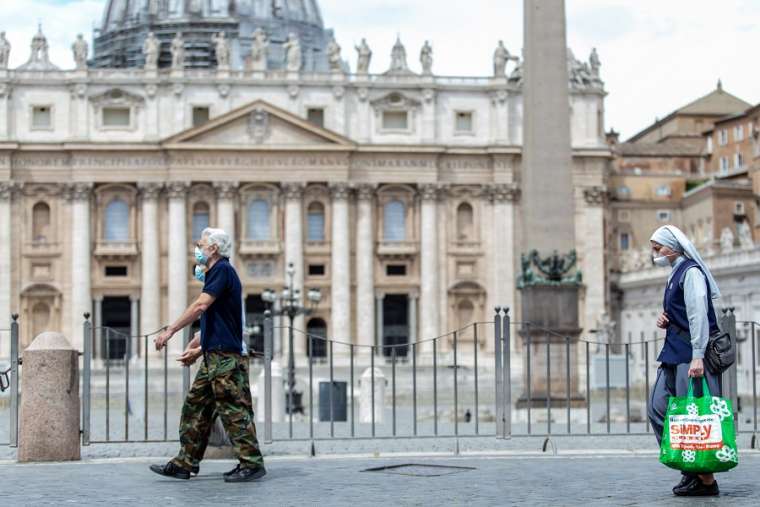People pass in front of St. Peter’s Basilica at the end of May 2020. Credit: Daniel Ibáñez/CNA.
Christians should respond to the coronavirus pandemic by showing “interreligious solidarity,” a new document jointly issued by a Vatican dicastery and a global ecumenical organisation said today.
The document, “Serving a Wounded World in Interreligious Solidarity,” was published Aug. 27 by the Pontifical Council for Interreligious Dialogue (PCID) and the World Council of Churches (WCC).
The new document, subtitled “A Christian Call to Reflection and Action During COVID-19 and Beyond,” seeks “to offer a Christian basis for interreligious solidarity that can inspire and confirm, in Christians of all churches, the impulse to serve a world wounded not only by the COVID-19 pandemic but also by many other wounds.”
The text argues that, for Christians, the basis for “interreligious
solidarity” is found in the Holy Trinity, “our belief in God who is one in three Persons, Father, Son, and Holy Spirit.” It lays out principles for expressing this solidarity amid a global pandemic that has claimed more than 822,000 lives.
The 24-page publication also offers a series of recommendations, urging Christians to “promote a culture of inclusivism which celebrates difference as God’s gift” and create “space for dialogues.”
The document is not the first to be jointly issued by the PCID and WCC. In May 2019, the two bodies published “Education for Peace in a Multi-Religious World: A Christian Perspective.”
The WCC is a global ecumenical body founded in 1948. The Catholic Church is not a member of the organization, though it sends official observers to meetings.
“For Christians, interreligious solidarity is a way both of living out Jesus Christ’s commandment to love the other, and also of working with the other to seek peace which is God’s will for the world,” the new document concluded.
“Growing in love for those whom we help, for those with whom we help, and for those who help us, creates many ways for us to live fully into what God created us to be — bearers of the divine image, and sharers of this image with others.
Source: CNA

